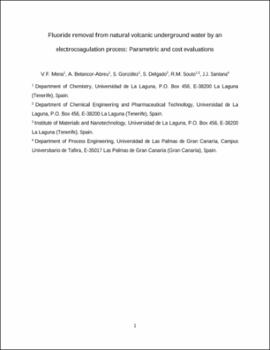Fluoride removal from natural volcanic underground water by an electrocoagulation process: Parametric and cost evaluations
Fecha
2019Resumen
The water supply on the island of Tenerife (Canary Islands, Spain) comes mainly from aquifers of volcanic origin that are notable for the high content of fluorides that make it unviable for human consumption without prior conditioning treatment. The treatments that generate a high rejection of water are not viable, since water is a scarce natural resource of high value. An electrocoagulation process was investigated as a method to treat natural groundwater from volcanic soils containing a dangerously high fluoride content. The operating parameters of an electrocoagulation reactor model with parallel plate aluminum electrodes were optimized for batch and continuous flow operations. In the case of batch operation, it was found that acidification of the water improved fluoride elimination efficiency, with a maximum at pH 3. Yet, operation at the natural pH of the water achieved elimination efficiencies between 82 and 92% depending on the applied current density. An optimum current density of 5 mA/cm2 was found in terms of the highest removal efficiency, and the kinetics of fluoride removal was adjusted to a pseudo-second-order kinetics. In the continuous-flow operation, with an optimal residence time of 10 min and a separation of 0.5 cm between the electrodes, it was observed that the current density that would be applied would depend on the initial concentration of fluoride in the raw water. Then, an initial fluoride concentration of 6.02 mg/L required a current density > 7.5 mA/cm2 to comply with the legal guidelines in the product water, while for an initial concentration of 8.98 mg/L, the optimum current density was 10 mA/cm2. Under these operating conditions, the operating costs will vary between 0.20 and 0.26 €/m3 of treated water






